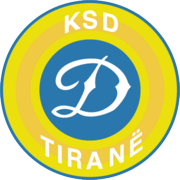 There are actually three teams in Tirana playing in the Albanian First Division, but I have adopted Dinamo because we live in the Dinamo area. From my balcony I can watch the team train, while the main stadium is five minutes walk away. Dinamo are the unfashionable team in Tirana (think Everton, Atletico, Torino), but still managed third place last season and are lying third this season.
There are actually three teams in Tirana playing in the Albanian First Division, but I have adopted Dinamo because we live in the Dinamo area. From my balcony I can watch the team train, while the main stadium is five minutes walk away. Dinamo are the unfashionable team in Tirana (think Everton, Atletico, Torino), but still managed third place last season and are lying third this season.That third place last year came despite having had no fewer than five coaches during the season. Coaching changes continued throughout the summer break. Ramon Cabrero, from Argentina, was brought in to boost Dinamo's chances in the Intertoto Cup, a competition as silly as its name. The team won 2-1 at home to NK Varteks of Croatia, then lost 4-1 away. Cabrero was sacked after 25 days in charge.
 Presumably impressed by the calibre of Croatian football, Dinamo brought in a Croat coach, Luka Bonacic, for the 2005-06 season. He was less than impressed with his new charges. 'The players are completely out of shape,' he complained. 'They go looking for water as soon as they move a little. They have to do some serious running in the next few weeks.'
Presumably impressed by the calibre of Croatian football, Dinamo brought in a Croat coach, Luka Bonacic, for the 2005-06 season. He was less than impressed with his new charges. 'The players are completely out of shape,' he complained. 'They go looking for water as soon as they move a little. They have to do some serious running in the next few weeks.'
Local coach Vasil Bici took over and seemed to be doing a creditable job, but in November he too was replaced. The new man was another Croat, Ivan Katalinić. At the same time, Dinamo also sacked three players for lack of commitment, so perhaps Bonacic's criticisms had an effect. As far as I know Katalinić is still in charge, but with two critical games coming up in the next few weeks the pressure is on. Those games are at home against Elbasan, currently leading the league, and away to another Tirana team, Partisan, who are in second place four points ahead of Dinamo.
Alongside foreign coaches, Dinamo also have their share of foreign players. At the moment they have two Senegalese players on their books, Masseye Gaye, a midefielder, and El Hadji Goudjabi, a striker, who is also joint second in the goalscoring table for this season with eight goals so far.There are a number of African footballers playing in Albania, presumably all dreaming of being noticed and getting transferred to a bigger club in a richer place. What they make of Albania is hard to imagine but I suspect their experience is similar to that of Edward Anyamkyegh at Karpaty Lviv, described by Franklin Foer in his superb book, How Soccer Explains the World.
If this was one of those sophisticated cultural and political blogs I could undoubtedly offer some insightful and discerning analysis of the state of Albanian society drawn from the nature of its football. But it's nearly three in the afternoon - coffee time - and I still have to add the photographs (all taken from the web, but I hope to add some of my own later).
I also hope to get to one or both of Dinamo's forthcoming crunch games against Elbasan and Partisan, if I can find out the kick-off times and manage to buy tickets with my pidgin Albanian. I will let you know the results - and the fate of Mr. Katalinić. I know you'll be waiting.
Comments
I was out in Tirana for a few days in early 2005 and have memories of the many bunkers littering the landscape, stray dogs, holes in the road, and a marble staircase in one building that almost did for me! (my fault - no grip on my shoes)
Just another two day visit planned again this time so I'll only really be free one evening unless I end up dining out with work colleagues - have you met many other ex-pats out there? You might even know the people I'm going out there to visit!
Stay in touch.
Gavin
They are fond of marble out here. My house has a marble staircase and I've almost come to grief quite a few times.
Thanks for the posts.
Ll.T.
Nice blog you have in here. How do things look from the ground at Zogu i Zi? It's so hard to understand anything from the newspapers because most of them have a political agenda to push.
Anyway, it's great to follow a local football team, you'd get to know a lot more about the place that way, probably more that in any other way. But, c'mon man, Dinamo??? Do you know what Dinamo simbolized during the comunist era? It was the team of the Ministry of Interior, in other words it was the team of the repressive security services, the spies of the Sigurimi. Their supporters were typically policemen, spies, jail guards, who would beat you up half-dead, if they only had a bad hair day. Back in the day, we used to call Dinamo fans, "fuksa", "hafije" - I hope you know what that is.
The best teams in Alb, have traditionally been Tirana, Vllaznia and Flamurtari anyway. Partizani and Dinamo were like these big monsters, who could recruit anywhere in the country; they were like those animals overgrown in nuclear waste, scary but with no heart or soul.